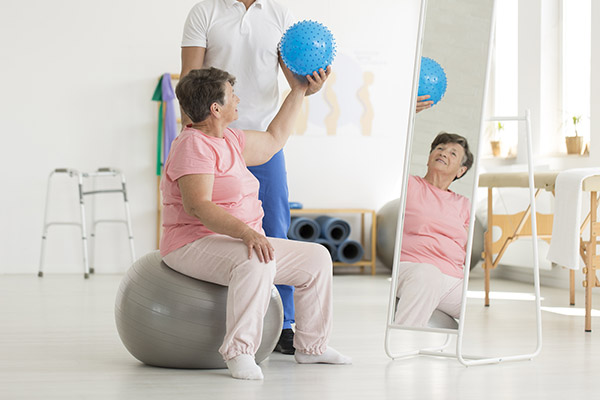Everything you do in your daily life, whether for daily living, work, or fun requires balance. Walking, getting up from a chair, cleaning the house, and reaching in the cupboard are all activities that require balance. All of these tasks require balance control but should be automatic processes that require minimal attention to balance. However, when there is a balance problem, these processes are no longer automatic and take conscious effort. It can cause disruptions in your daily routine and increase you risk for falls.
What is balance?
Balance is a complex process that depends on three components:
- Sensory systems to communicate incoming information about our body and its relationship to the environment around you
- Your brain to process this incoming information
- Your muscles and joints for coordinating the movements required to respond to the brain's interpretation to sensory input
Balance control is accomplished without requiring our conscious attention. When there are balance deficits, we have to exert conscious effort to try to overcome obstacles and complete daily tasks. It can result in fatigue, shortened attention span, and reduce a person's ability to complete several tasks at once.
Loss of balance
In a normal healthy individual, the three senses of vision, hearing, and touch work together to perceive where the body and head are in space. They provide information about the environment around us. These sensory systems communicate with the brain to ensure optimal stability. When a person has a balance disorder, one may have a problem in any one of these systems or multiple systems. The risk of developing one or more of these problems increases with age due to potential degenerative changes that occur over time, infectious diseases, and/or the effects of injuries accumulated over a lifetime.
Identify, treat, and improve balance
Balance can improve and fall risk can reduce! Although age, past medical history, and medical conditions play a role in someone's overall balance, it does not limit them from improving balance. Balance is quickly learned and improved when practiced. The key component of improving one's balance is understanding what component part of balance is compromised. Because of the complexity of balance control, not all balance problems are the same. Determining the cause of a balance disorder and what treatment options are the most appropriate can be difficult. However, there have been significant advances in evaluation and treatment approaches for balance disorders that have proven to be highly effective and offer relief to those suffering from imbalance or dizziness. There are also medical professionals and clinicians who are specially trained to apply these evaluation and treatment methods.
It is not uncommon for individuals with a history of balance problems to regain their balance control through accurate diagnosis followed by specific medical treatment and/or rehabilitation exercises. Balance can be practiced, balance can improve, and fall risk can decrease!
Our locations:
- Kennedy: (412)-771-1055
- Crafton: (412)-458-3445
- Allison Park: (412)-487-2787
- Bethel Park: (412) 835-2626
- Atlasburg: (724) 947-9999
Website: www.hesspt.com
Disclaimer: this information is "not medical advice" and is used at the site visitor's own risk.
